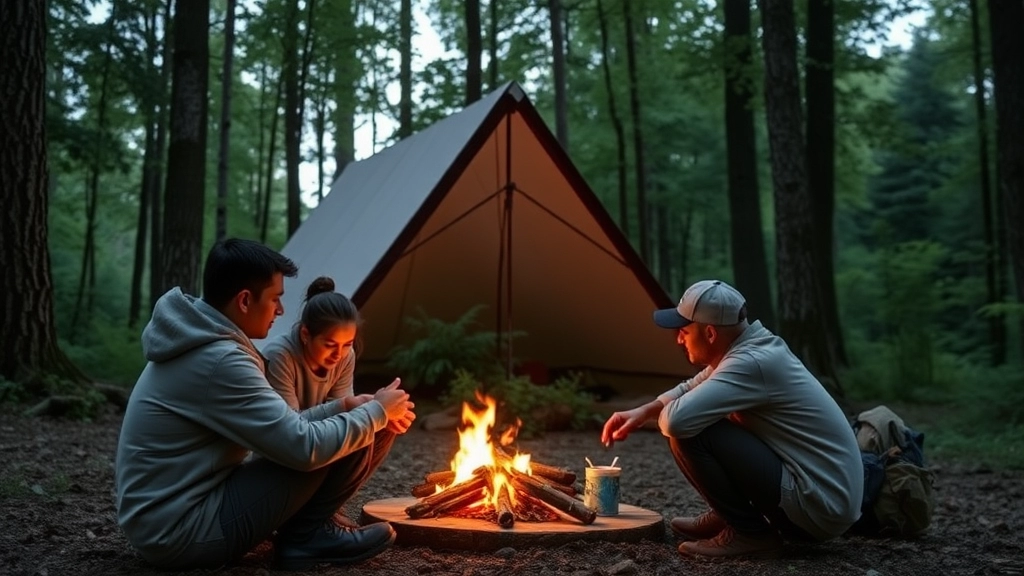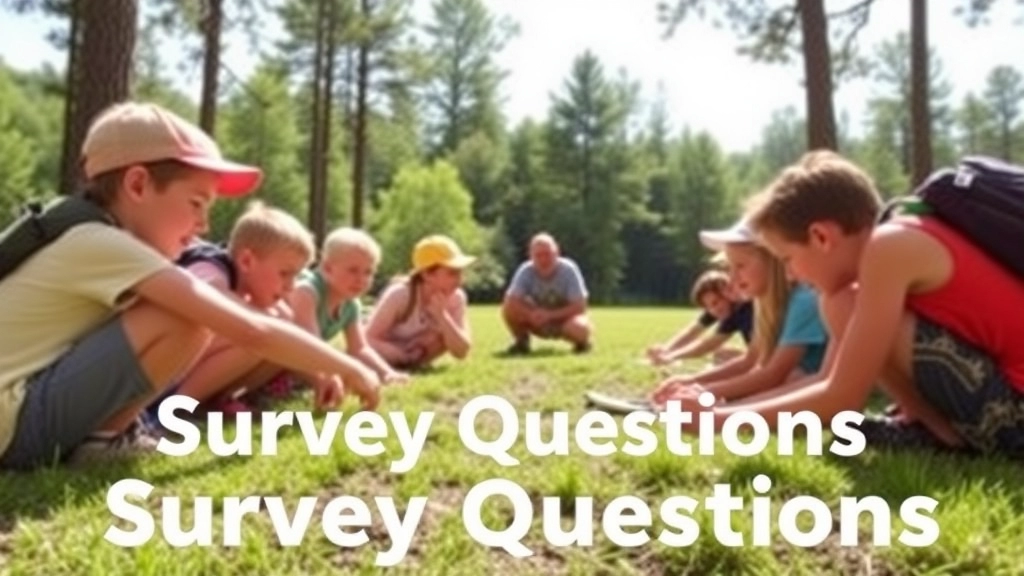Enhancing the Summer Camp Experience Through Feedback
Gathering insightful feedback through well-crafted summer camp survey questions is essential for enhancing the overall camp experience. This article delves into the key aspects of creating effective surveys, from evaluating camp activities and programs to assessing staff performance and understanding camper satisfaction. By asking the right questions, you can gather valuable data to improve camp facilities, communication, and overall camper experience, ensuring your camp remains a top choice for families year after year.
Best Practices for Conducting Summer Camp Surveys
We’ll explore best practices for conducting summer camp surveys, including how to collect demographic information and analyze survey results for future planning. Real-life examples and actionable tips will guide you in identifying areas for improvement and implementing changes that resonate with both campers and parents.
Key Areas of Focus
- Boosting Engagement
- Enhancing Safety
- Making Camp More Fun
Whether you’re looking to boost engagement, enhance safety, or simply make the camp more fun, this comprehensive guide will provide you with the tools and insights needed to make informed decisions and elevate your summer camp to new heights.
Key Questions to Ask in a Summer Camp Survey
Alright, let’s dive in. If you’re running a summer camp, you know that getting feedback is crucial. You want to know what’s working, what’s not, and how you can make it better. So, what are the key questions to ask in a summer camp survey? Let’s break it down.
What Are the Must-Ask Questions?
First off, you need to hit the basics. These are the questions that will give you a solid overview of your camp’s performance.
- Overall Experience: “How would you rate your overall experience at the camp?”
- Favourite Activities: “Which activities did you enjoy the most?”
- Least Favourite Activities: “Which activities did you enjoy the least?”
- Staff Interaction: “How would you rate your interactions with the camp staff and counselors?”
- Facilities: “How would you rate the camp facilities (cabins, dining hall, restrooms, etc.)?”
Digging Deeper
Once you’ve got the basics covered, it’s time to dig a bit deeper. These questions will help you understand the nuances of your campers’ experiences.
- Skill Development: “Did you learn any new skills? If so, what were they?”
- Safety: “Did you feel safe during your time at the camp?”
- Communication: “How effective was the communication from the camp staff before and during the camp?”
- Social Experience: “Did you make new friends? How easy was it to connect with other campers?”
Getting Specific
Now, let’s get into the nitty-gritty. These are the questions that can reveal specific areas for improvement.
- Activity Suggestions: “Are there any activities you wish the camp had offered?”
- Staff Feedback: “Is there any feedback you would like to give about the camp staff or counselors?”
- Facility Improvements: “What improvements would you suggest for the camp facilities?”
- Future Camps: “Would you consider attending this camp again? Why or why not?”
Real Questions and Worries
Look, I get it. You want to make sure your camp is the best it can be. You might be worried about low attendance next year or negative reviews from parents. These questions will help you address those concerns head-on.
- Parent Feedback: “Parents, do you have any feedback or concerns about your child’s experience?”
- Return Rate: “Campers, would you recommend this camp to a friend?”
- Problem Areas: “Were there any problems or issues you faced during your time at the camp?”
Keep It Real and Engaging
Remember, the goal here is to keep it real, fresh, and engaging. Imagine you’re sharing these insights over coffee with a pal. No fluff, no cringe, just straight talk. And hey, if you can sprinkle in a story or two, even better. For example, “One camper told us they loved the archery class but wished it was offered more frequently. That’s the kind of specific feedback we need.”
For more tips on making your camp a hit, check out our guide on summer camp layout design and our article on summer camp craft ideas.
Evaluating Camp Activities and Programs

Alright, let’s dive into the nitty-gritty of evaluating camp activities and programs.
Ever wondered if the activities at your summer camp are hitting the mark?
I mean, are they really engaging the kids or just filling up time?
Here’s how we can break it down:
What’s Working and What’s Not?
First off, you need to know what’s working and what’s not.
Ask yourself:
- Are the kids excited about the activities?
- Are they learning new skills?
- Are they making friends?
If you’re not sure, it’s time to ask them directly.
Survey Questions to Gauge Interest
Get straight to the point with your survey questions:
- Which activity did you enjoy the most?
- Which activity did you enjoy the least?
- What new activity would you like to see next summer?
These questions will give you a solid understanding of what’s popular and what’s a flop.
Real-Life Examples
Let me share a quick story.
Last summer, we introduced a new archery program.
We thought it would be a hit.
Turns out, only a handful of kids were into it.
We found this out through our surveys.
So, we pivoted and introduced a dance workshop instead.
Guess what? It was a smash hit!
Keep It Fresh
You don’t want your camp to feel like a rerun of last year.
Mix things up:
- Rotate activities every few weeks
- Introduce surprise events
- Collaborate with local experts for special sessions
Feedback Loop
Create a feedback loop with your campers:
- Weekly check-ins
- Suggestion boxes
- End-of-camp surveys
This keeps the activities dynamic and exciting.
Semantically Relevant Keywords
Don’t forget to sprinkle in keywords like “camp programs,” “summer activities,” and “camper engagement.”
These help in making your content more searchable.
Wrap It Up
Evaluating camp activities and programs isn’t just about knowing what’s fun.
It’s about creating an environment where kids can grow, learn, and make memories.
Internal Links
For more insights, check out our sections on Assessing Camp Staff and Counselors and Understanding Camper Satisfaction and Feedback.
Assessing Camp Staff and Counselors
When it comes to summer camps, the quality of the staff and counsellors can make or break the experience for your kids. So, let’s cut to the chase and dive into the nitty-gritty of assessing camp staff and counsellors. Trust me, this is crucial for ensuring your child has a memorable and safe summer.
Real Questions Parents Have
- “Are the staff qualified and experienced?”
- “How do they handle emergencies or conflicts?”
- “Will my child feel supported and safe?”
These are the burning questions every parent has, and rightly so. We’re talking about the people who will be guiding, teaching, and looking after your kids for weeks. So, let’s break it down.
Key Aspects to Evaluate
Qualifications and Training
- Certifications: Are the counsellors certified in first aid and CPR?
- Experience: Do they have previous experience working with kids?
- Special Skills: Are there any staff with special skills like lifeguarding or adventure sports?
Background Checks
- Screening: Have all staff undergone thorough background checks?
- References: Are there positive references from past employers or parents?
Interaction with Campers
- Engagement: Do they actively engage with the kids or just supervise from a distance?
- Conflict Resolution: How do they handle conflicts among campers?
- Support: Are they approachable and supportive for kids who might be homesick or struggling?
Communication with Parents
- Updates: Do they provide regular updates to parents about their child’s progress and well-being?
- Accessibility: Are they easy to reach if you have any concerns or questions?
Real-Life Example
Imagine this: Your kid comes home from camp and can’t stop talking about how their counsellor taught them to swim, helped them make new friends, and was there to comfort them when they felt homesick. That’s the kind of impact a great counsellor can have.
Tips for Evaluating Camp Staff and Counselors
- Ask for a Meet-and-Greet: Before you commit, see if you can meet some of the staff. First impressions matter.
- Read Reviews: Check online reviews or ask other parents for their experiences.
- Trust Your Gut: If something feels off, it probably is.
Why This Matters
The staff and counsellors are the backbone of any camp. They set the tone, ensure safety, and create an environment where kids can thrive. By thoroughly assessing them, you’re not just ensuring a good time for your child but also peace of mind for yourself.
For a comprehensive guide on how to get started with organizing a camp, check out our complete guide on starting a summer camp. Additionally, if you’re looking for tips on making your child’s camp experience even better, don’t miss our FSA tips for summer camp savings.
Understanding Camper Satisfaction and Feedback

Alright, let’s talk about something that really matters—camper satisfaction.
You want to know if the kids had a blast, right?
Did they make new friends?
Did they love the activities?
Or were they counting the days to go home?
Here’s how to get the lowdown.
Why Camper Satisfaction Matters
Happy campers mean repeat business and glowing reviews.
Unhappy campers?
Well, that’s a whole different story.
You want to know what worked and what didn’t.
Key Questions to Ask
- Did you enjoy your time at camp? Simple, but straight to the point.
- What was your favourite activity? This tells you what’s a hit.
- Was there anything you didn’t like? Helps you spot the duds.
- Did you feel safe and well cared for? Crucial for peace of mind.
- Would you come back next year? The ultimate litmus test.
Using Feedback for Improvement
Once you’ve got the answers, don’t just file them away.
Use them.
- Identify trends: If multiple kids hated the same activity, maybe it’s time to rethink it.
- Highlight wins: Did everyone love the new zip line? Great, do more of that.
- Address concerns: If safety was an issue, fix it ASAP.
Real Stories, Real Impact
Last summer, we had a kid named Jake who was super shy.
His parents were worried he wouldn’t fit in.
But guess what?
By the end of camp, he was leading the talent show.
His feedback?
“Best summer ever.”
That’s the kind of impact you’re looking for.
Making It Easy for Campers
Kids aren’t going to sit down and write essays.
Keep it simple.
- Quick surveys
- Smiley face ratings
- Optional comments
Make it fun, make it quick, and you’ll get honest answers.
Gathering Insights on Camp Facilities and Amenities
Alright, let’s dive straight into it. When it comes to summer camps, the facilities and amenities can make or break the experience for campers and their parents. So, how do we get the real scoop on what’s working and what’s not? Let’s break it down.
Why Facilities and Amenities Matter
First off, let’s talk about why camp facilities and amenities are such a big deal. Parents want to know that their kids are safe, comfortable, and entertained. And campers? They want cool stuff to do and a place that feels like a home away from home. So, how do we get this info? By asking the right questions.
Key Questions to Ask
When we’re gathering insights on camp facilities and amenities, we need to be specific. Here are some questions that hit the mark:
- How would you rate the cleanliness of the camp facilities?
- Were the sleeping arrangements comfortable?
- Did the dining facilities meet your expectations in terms of food quality and variety?
- Were the recreational areas (like the swimming pool, sports fields, etc.) well-maintained?
- Did the camp provide sufficient and appropriate amenities (like bathrooms, showers, etc.)?
These questions get straight to the point and help us understand the camper’s experience without any fluff.
Real Concerns, Real Answers
Parents often worry about the nitty-gritty details like cleanliness and safety. Campers, on the other hand, are more focused on whether the activities were fun and the food was good. By addressing both sets of concerns, we can paint a full picture of the camp’s strengths and weaknesses.
Breaking Down Feedback
Now, let’s talk about how to make sense of the feedback we get. Here’s a simple way to break it down:
- Positive Feedback: Highlight what campers loved. Maybe the swimming pool was a hit, or the food was top-notch. These are your selling points.
- Negative Feedback: Identify areas that need improvement. If multiple campers mention that the bathrooms were dirty, that’s a red flag.
- Neutral Feedback: Sometimes, feedback isn’t clearly positive or negative. Use this to identify areas that are okay but could be better.
Real Stories, Real Impact
Let’s keep it real with a story. Last summer, we had a camper named Jack who absolutely loved the rock-climbing wall. His feedback? “The rock-climbing wall was the best part of camp! But the bathrooms? Not so much.” This kind of real, honest feedback is gold. It tells us what’s working and what needs fixing.
Actionable Insights
Once we’ve gathered and analysed the feedback, it’s time to take action. Here’s how:
- Prioritise Improvements: Focus on the most common issues first. If multiple campers mention the same problem, that’s where you start.
- Communicate Changes: Let parents and campers know what changes are being made based on their feedback. This builds trust and shows that you listen.
- Monitor Progress: Keep an eye on the areas you’ve improved. Are the changes making a difference? If not, tweak and adjust.
For more tips on how to enhance camp experiences, check out our Ultimate Summer Camp Schedule Template Guide and get inspired by creative activities from our Fun Science Activities for Kids.
Measuring the Effectiveness of Camp Communication

Alright, let’s get real here.
How often have you wondered if your camp communication is hitting the mark?
Is everyone in the loop, or are you dealing with a game of broken telephone?
Camp communication is crucial, and measuring its effectiveness can be a game-changer.
Let’s dive into how we can make sure everyone, from campers to parents, is on the same page.
Why Effective Communication Matters
First things first, why should you care?
- Safety: Clear communication ensures everyone knows the rules and emergency procedures.
- Engagement: Keeps campers and parents excited and informed.
- Feedback: Opens up channels for valuable insights and suggestions.
Key Areas to Evaluate
To measure how well your camp is communicating, focus on these areas:
- Pre-Camp Information:
- Are parents receiving all necessary details before camp starts?
- Is the registration process smooth?
- Daily Updates:
- Are you sending out daily or weekly updates?
- Do parents feel informed about their child’s activities and well-being?
- Emergency Communication:
- How quickly and effectively can you communicate in case of an emergency?
- Are there clear protocols in place?
- Feedback Channels:
- Are there easy ways for parents and campers to provide feedback?
- Are you acting on that feedback?
Tools and Methods
Let’s break down some tools and methods to measure this:
- Surveys: Simple and effective. Ask parents and campers directly about their communication experience.
- Emails and Newsletters: Track open and click rates to see if your messages are getting through.
- Social Media: Monitor engagement levels. Are parents and campers interacting with your posts?
- Face-to-Face: Never underestimate the power of a good old-fashioned conversation.
Real-Life Example
I once ran a camp where we thought our communication was top-notch.
Turns out, parents were missing key updates because our emails were landing in spam folders.
We switched to a dedicated camp app, and boom—communication issues solved.
Parents loved the instant notifications, and we saw a massive boost in engagement.
Action Steps
Here’s what you can do right now:
- Audit Your Current Communication: Identify what’s working and what’s not.
- Implement Feedback Channels: Make it easy for parents and campers to share their thoughts.
- Use Multiple Platforms: Don’t rely on just one method. Mix emails, social media, and face-to-face interactions.
- Regularly Review and Adjust: Keep tweaking until you find what works best.
Identifying Areas for Improvement
Alright, let’s cut to the chase. When it comes to summer camps, everyone’s got questions and worries. Are the activities engaging? Are the staff members friendly and competent? Are the facilities up to scratch? We all want the best for our kids, right? So, identifying areas for improvement in your summer camp is crucial.
Why It Matters
First off, if you’re not constantly looking for ways to improve, you’re standing still. And in today’s world, standing still is basically moving backwards. Improvement isn’t just about fixing problems; it’s about creating an experience that keeps campers coming back year after year.
Real Questions and Worries
When parents think about sending their kids to camp, they’re asking:
- Is my child going to be safe?
- Will they have fun and make friends?
- Are the facilities clean and well-maintained?
- Is the staff trained and responsible?
These are the questions we need to answer through our surveys to pinpoint where we can do better.
How to Identify Areas for Improvement
Direct Feedback
- Surveys: Ask specific questions about each aspect of the camp. Use a mix of multiple-choice questions and open-ended questions to get both quantitative and qualitative data.
- Interviews: Conduct interviews with campers, parents, and staff. Sometimes, a conversation can reveal insights that a survey might miss.
Observation
- Staff Reports: Have your staff note any recurring issues or areas where campers seem less engaged.
- Camper Behaviour: Observe how campers interact with activities and each other. Are there activities that consistently fail to hold their interest?
Data Analysis
- Attendance Records: Look at which activities have the highest and lowest attendance.
- Feedback Trends: Analyse survey results to identify common themes or complaints.
Practical Tips for Implementation
- Create a Feedback Loop: Make it easy for parents and campers to provide feedback, not just at the end of the camp, but throughout the season.
- Act on Feedback: Show that you’re listening by making visible changes based on the feedback you receive. This builds trust and shows that you’re committed to improvement.
- Regular Training: Ensure your staff is regularly trained and updated on best practices. This can help address many of the common issues before they become problems.
Real-Life Example
Let me share a quick story. One summer, we noticed that our arts and crafts sessions were getting low attendance. We dug into the feedback and found out that the materials we were using were outdated and not very exciting. So, we revamped the program with new, trendy materials and brought in a local artist to lead the sessions. The next year, attendance skyrocketed, and it became one of our most popular activities.
For more creative ideas to enhance your camp, check out our summer camp craft ideas for all ages. If you’re looking to add some excitement to your program, explore our fun and creative summer camp theme days.
Collecting Demographic Information

Alright, let’s talk about collecting demographic information.
This might sound boring, but it’s crucial for understanding who your campers are and making your camp better.
Why Bother with Demographics?
Ever wonder why some activities are a hit while others flop?
It’s all about knowing your audience.
Collecting demographic information helps you tailor your camp to meet the needs and interests of your campers.
What to Ask?
Here’s a quick list of what you should include:
- Age: Are you catering to 7-year-olds or 17-year-olds? Big difference.
- Gender: Helps in planning activities and accommodations.
- Location: Where are your campers coming from? This can influence travel arrangements and marketing.
- Previous Attendance: First-timers or returning campers? This impacts how you welcome them.
- Interests: What do they love doing? Sports, arts, science?
How to Collect It?
You don’t need to get all Sherlock Holmes about it.
Keep it simple.
- Surveys: Include demographic questions in your post-camp surveys.
- Registration Forms: Add demographic fields when campers sign up.
- Interviews: Sometimes a quick chat can give you loads of info.
Real Talk: Why It Matters
Imagine you’re running a sports camp.
If most of your campers prefer arts and crafts, you’re missing the mark.
Or, if you find out a large chunk of your campers are from a specific area, you can target your marketing there.
Pro Tips
- Be Respectful: Don’t ask for info you don’t need. Keep it relevant.
- Keep it Anonymous: If campers feel their info is safe, they’re more likely to share.
- Use the Data: Don’t just collect it. Analyse it and make changes based on what you find.
Analyzing Survey Results for Future Planning
Alright, let’s dive into something crucial but often overlooked: Analyzing Survey Results for Future Planning. You’ve got all this data from your summer camp survey, but what now? How do you turn those numbers and comments into actionable steps for next year? Let’s break it down.
Why Analyzing Survey Results Matters
First off, why should you care about analyzing survey results? Simple. It’s the backbone of making your camp better. If you want to boost camper satisfaction, improve activities, and make your camp the best in the biz, you’ve got to dig into that data.
Steps to Analyze Your Survey Results
-
Organize Your Data
- Categorize Responses: Split the feedback into categories like activities, staff, facilities, and overall satisfaction.
- Use Tools: Excel, Google Sheets, or any survey software can help you sort and filter data.
-
Look for Patterns
- Common Complaints or Praises: Are multiple campers mentioning the same issue or highlight? That’s your goldmine.
- Frequency Analysis: How often do certain comments appear? If 80% of campers loved the new zipline, that’s a win.
-
Quantitative Analysis
- Averages and Percentages: Calculate the average satisfaction score for different aspects of the camp.
- Trends Over Time: Compare this year’s data with previous years to see if you’re improving or not.
-
Qualitative Analysis
- Thematic Analysis: Identify recurring themes in open-ended responses.
- Sentiment Analysis: Gauge the overall tone of the feedback. Are campers generally happy, neutral, or dissatisfied?
Making Data-Driven Decisions
So, you’ve got your analysis. Now what? Here’s how you can use it to plan for the future:
- Prioritize Issues: Focus on the areas that need the most improvement. If the food gets a thumbs down from most campers, that’s your starting point.
- Enhance Popular Activities: If campers rave about certain activities, think about expanding or enhancing them.
- Staff Training: Use feedback about staff to tailor training programs. If counselors are a hit, find out why and replicate that across the board.
Real-Life Example
Imagine you run a summer camp and the survey results show that 70% of campers love the arts and crafts sessions, but only 30% enjoy the hiking trips. What do you do?
- Boost Arts and Crafts: Maybe add more sessions, bring in guest artists, or offer advanced workshops.
- Revamp Hiking: Look into why hiking isn’t hitting the mark. Is it the trails, the guides, or something else? Fix it or replace it with a different outdoor activity.
Tools to Help You Analyze
- Survey Software: Platforms like SurveyMonkey or Typeform often offer built-in analytics.
- Data Visualization Tools: Tools like Tableau or Google Data Studio can help you visualize your data, making it easier to spot trends.
For more insights on enhancing your summer camp offerings, check out our Summer Camp Creative Arts and Crafts Ideas and discover the Top Summer Camp Games and Activities Guide.
Best Practices for Conducting Summer Camp Surveys
Alright, let’s get real.
You’ve just wrapped up another summer camp season and you’re itching to know how it went.
You need feedbackâreal, honest feedbackâfrom campers and parents alike.
So, how do you make sure your survey hits the mark?
Let’s dive in.
Start With Clear Objectives
First things first, know what you’re after.
Are you looking to improve activities?
Or maybe you want to get a read on staff performance?
Be clear about your goals.
Keep It Short and Sweet
No one wants to spend 20 minutes filling out a survey.
Aim for 10 questions or less.
Trust me, the shorter, the better.
Use a Mix of Question Types
Variety keeps it interesting.
Use multiple-choice for quick answers.
Throw in a few open-ended questions for deeper insights.
Make It Mobile-Friendly
Everyone’s on their phones these days.
If your survey isn’t mobile-friendly, you’re missing out.
Offer Incentives
People love free stuff.
Offer a small incentive for completing the survey.
A discount on next year’s camp or a small gift card can go a long way.
Ensure Anonymity
People are more honest when they know their responses are anonymous.
Make sure to remind them of this.
Timing is Key
Send out your survey while the camp experience is still fresh.
A week after camp ends is ideal.
Follow Up
Once you’ve got your results, let people know what you’re doing with their feedback.
It shows you’re listening and that you care.
Use Simple Language
Skip the jargon.
Keep it simple, straightforward, and easy to understand.
Test Before Sending
Do a dry run with a small group first.
Iron out any kinks before you send it to everyone.
Analyse and Act
Don’t just collect dataâuse it.
Analyse the results and make concrete plans for improvement.
Real Stories, Real Feedback
When you share your survey results, sprinkle in some real stories and examples.
It makes the feedback relatable and actionable.
Keep It Fresh
Update your survey every year.
Keep questions relevant to current camp activities and trends.
FAQs and Common Concerns
Address common questions and worries right in the survey.
It shows you’re in tune with your audience’s needs.
For more tips on enhancing your summer camp experience, check out our Summer Camp Rules and Regulations Guide and explore some Fun and Creative Summer Camp Projects.
FAQs on Summer Camp Survey Questions
Why should I evaluate camp activities and programs?
Evaluating camp activities and programs helps you understand what engages the kids, what they enjoy, and what might need improvement. This ensures that the camp remains dynamic and fun, fostering an environment where kids can grow and make lasting memories.
What are some effective survey questions to gauge camper interest in activities?
Effective survey questions include:
- Which activity did you enjoy the most?
- Which activity did you enjoy the least?
- What new activity would you like to see next summer?
These questions help identify popular activities and those that may need rethinking.
How can I keep camp activities fresh and exciting?
To keep camp activities fresh, consider rotating activities every few weeks, introducing surprise events, and collaborating with local experts for special sessions. This prevents the camp from feeling repetitive and keeps campers engaged.
Why is camper satisfaction important?
Camper satisfaction is crucial because happy campers are more likely to return and provide positive reviews. Understanding their experience helps you improve the camp and ensure a fun, safe, and memorable time for all participants.
What key questions should I ask to measure camper satisfaction?
Key questions include:
- Did you enjoy your time at camp?
- What was your favourite activity?
- Was there anything you didn’t like?
- Did you feel safe and well cared for?
- Would you come back next year?
These questions provide a comprehensive view of the camper’s experience.
How can I measure the effectiveness of camp communication?
To measure the effectiveness of camp communication, focus on areas such as pre-camp information, daily updates, emergency communication, and feedback channels. Use tools like surveys, emails, social media, and face-to-face interactions to gather insights.
What are some methods to collect demographic information from campers?
Methods to collect demographic information include:
- Surveys: Include demographic questions in post-camp surveys.
- Registration Forms: Add demographic fields when campers sign up.
- Interviews: Quick chats can provide valuable information.
This information helps tailor the camp to better meet the needs and interests of the campers.
Why is collecting demographic information important?
Collecting demographic information helps you understand your audience, tailor activities to their interests, and improve marketing strategies. It ensures that the camp meets the needs of its campers and remains relevant and engaging.
How can I ensure that feedback from campers and parents is effectively used?
To effectively use feedback, identify trends, highlight wins, and address concerns promptly. Regularly review feedback, make necessary adjustments, and keep communication channels open to ensure continuous improvement.
What are some ways to make feedback collection fun and engaging for campers?
Make feedback collection fun and engaging by using quick surveys, smiley face ratings, and optional comments. Keeping it simple and enjoyable encourages honest responses and valuable insights.
References
-
Evaluating Camp Programs and Activities
-
Understanding Camper Satisfaction and Feedback
-
Measuring the Effectiveness of Camp Communication

